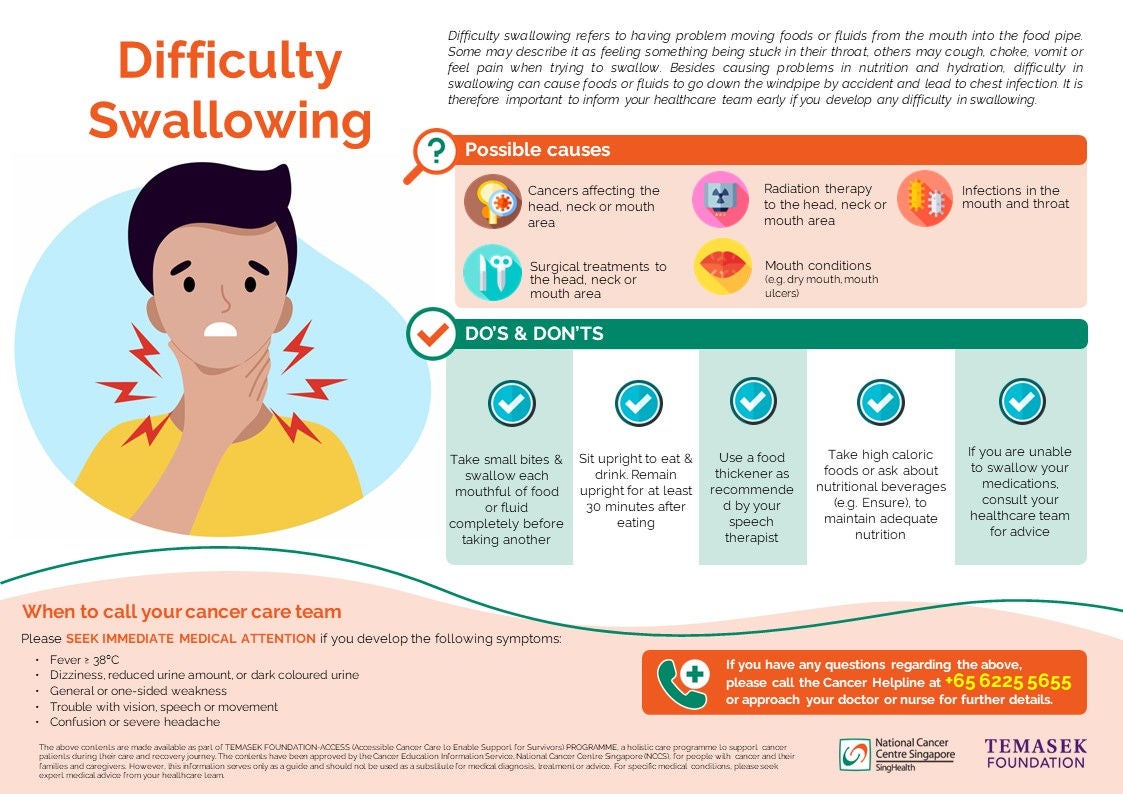National Cancer Centre Singapore will NEVER ask you to transfer money over a call. If in doubt, call the 24/7 ScamShield helpline at 1799, or visit the ScamShield website at www.scamshield.gov.sg.
Difficulty swallowing (Dysphagia)
- Allergies
- Appetite Loss
- Bone Problems
- Breathing Problems
- Constipation
- Diarrhoea
- Difficulty Swallowing (Dysphagia)
- Dry Mouth (Xerostomia)
- Difficulty Sleeping (Insomnia)
- Feeling Tired (Fatigue)
- Fevers and Infections
- Hair Loss
- Heart Problems
- Menopausal Symptoms
- Indigestion
- Joint Pains
- Limb Swelling (Lymphedema)
- Muscle Aches
- Nail Changes
- Nausea and Vomiting
- Pain
- Tingling or Numbness in Hands or Feet (Peripheral Neuropathy)
- Skin Changes
- Sore Mouth (Oral Mucositis)
- Taste Changes

Difficulty swallowing, also known as dysphagia, refers to having problem moving food or fluids from the mouth into the food pipe. While some may feel like there is something being stuck in their throat, others may cough, choke, vomit or feel pain when trying to swallow food or fluids.
Causes of difficulty swallowing
- Cancers in the mouth, throat or food pipe may narrow the spaces by which food and fluid passes, making swallowing difficult
- Surgical treatments to the mouth, jaw, throat or food pipe can cause physical changes that makes swallowing difficult
- Radiation therapy can cause scarring (also known as fibrosis), as well as swelling or narrowing in the area
- Chemotherapy and radiation therapy can also cause dry mouth and mouth ulcers, which lead to pain that makes swallowing difficult
- Infections in the mouth and throat can also cause painful swallowing
What you need to look out for
While difficulty swallowing may be a short-term side effect in some people with cancer, it can also be a longer-term problem for others. Having difficulty in swallowing will interfere with eating and drinking, and in turn cause problems with nutrition, hydration, and your overall wellbeing. It can also cause foods and fluids to go down your windpipe by accident, and this can lead to chest infection. It is thus important to inform your doctor or nurse early if you develop any of the following:
- Difficulty swallowing foods or fluids
- Coughing, vomiting or choking when trying to swallow foods or fluids
- Sensation of food being stuck in throat
- Pain in your mouth, lips or throat
- Dry mouth
- An unexpected decrease in your weight
- Fever
How it can be treated
The treatment for swallowing problems depends on its cause. For instance, if pain in your throat is causing difficulty in swallowing, your doctor or nurse will prescribe you with mouth gels or medications to help relieve the pain. Your doctor may also refer you to a speech therapist, who will assess your ability to safely swallow and recommend any food modifications if needed. To ensure your nutrition, your doctor may sometimes advise to place a feeding tube to deliver liquid nutrition, and/or refer you to a dietician who can work out a nutrition care plan for you.
What you can do
If you have difficulty swallowing, your doctor or speech therapist will be able to advise you on the type of food that will be safe for you to take. Below are some tips that you may find helpful in coping with your condition:
|
|
For painful swallowing:
|
|
To ensure nutrition:
|
|
If you are able to take soft foods:
|
|
If you are able to take pureed foods:
|
When to call your cancer care team
To prevent complications, please inform your doctor or nurse as soon as you notice any symptoms as mentioned above, or if they worsen.
If you have any questions regarding the above, please call Cancer Helpline at +65 6225 5655 or approach your doctor or nurse for further details.
Click here to download the PDF version of this article.
如果您要下载本文的中文版本,请点击此处。
Klik di sini untuk memuat turun versi PDF artikel ini.
The above contents are made available as part of TEMASEK FOUNDATION-ACCESS (Accessible Cancer Care to Enable Support for Survivors) PROGRAMME, a holistic care programme to support cancer patients during their care and recovery journey.
The contents have been approved by the Cancer Education Information Service, National Cancer Centre Singapore (NCCS), for people with cancer and their families and caregivers. However, this information serves only as a guide and should not be used as a substitute for medical diagnosis, treatment or advice. For specific medical conditions, please seek expert medical advice from your healthcare team.
Brought to you by:
![]()
![]()
Keep Healthy With
© 2025 SingHealth Group. All Rights Reserved.

















